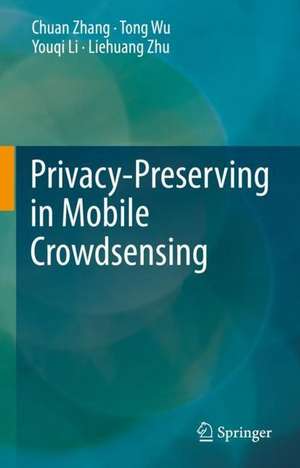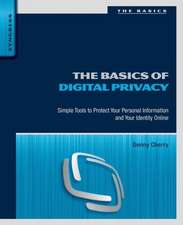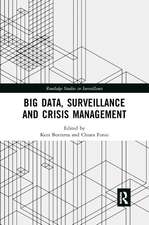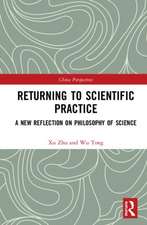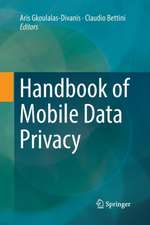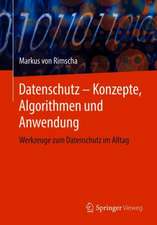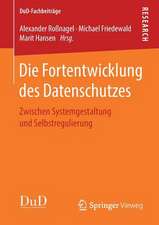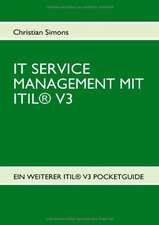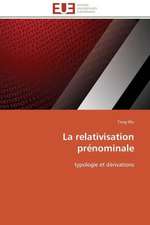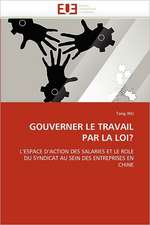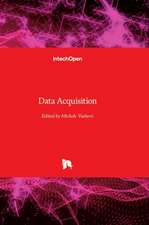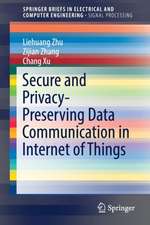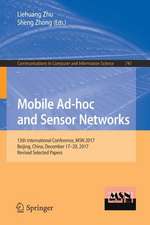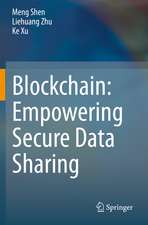Privacy-Preserving in Mobile Crowdsensing
Autor Chuan Zhang, Tong Wu, Youqi Li, Liehuang Zhuen Limba Engleză Hardback – 25 mar 2023
In this book, we discuss the research background and current research process of privacy protection in mobile crowdsensing. In the first chapter, the background, system model, and threat model of mobile crowdsensing are introduced. The second chapter discusses the current techniques to protect user privacy in mobile crowdsensing. Chapter three introduces the privacy-preserving content-based task allocation scheme. Chapter fourfurther introduces the privacy-preserving location-based task scheme. Chapter five presents the scheme of privacy-preserving truth discovery with truth transparency. Chapter six proposes the scheme of privacy-preserving truth discovery with truth hiding. Chapter seven summarizes this monograph and proposes future research directions.
In summary, this book introduces the following techniques in mobile crowdsensing: 1) describe a randomizable matrix-based task-matching method to protect task privacy and enable secure content-based task allocation; 2) describe a multi-clouds randomizable matrix-based task-matching method to protect location privacy and enable secure arbitrary range queries; and 3) describe privacy-preserving truth discovery methods to support efficient and secure truth discovery. These techniques are vital to the rapid development of privacy-preserving in mobile crowdsensing.
Preț: 1046.24 lei
Preț vechi: 1307.80 lei
-20% Nou
Puncte Express: 1569
Preț estimativ în valută:
200.21€ • 210.52$ • 165.42£
200.21€ • 210.52$ • 165.42£
Carte tipărită la comandă
Livrare economică 17 aprilie-01 mai
Preluare comenzi: 021 569.72.76
Specificații
ISBN-13: 9789811983146
ISBN-10: 9811983143
Pagini: 197
Ilustrații: XVII, 197 p. 1 illus.
Dimensiuni: 155 x 235 mm
Greutate: 0.48 kg
Ediția:2023
Editura: Springer Nature Singapore
Colecția Springer
Locul publicării:Singapore, Singapore
ISBN-10: 9811983143
Pagini: 197
Ilustrații: XVII, 197 p. 1 illus.
Dimensiuni: 155 x 235 mm
Greutate: 0.48 kg
Ediția:2023
Editura: Springer Nature Singapore
Colecția Springer
Locul publicării:Singapore, Singapore
Cuprins
Part I. Overview and Basic Concept of Mobile Crowdsensing Technology.- Chapter 1. Introduction.- Chapter 2. Overview of Mobile Crowdsensing Technology.- Part II. Privacy-Preserving Task Allocation.- Chapter 3. Privacy-Preserving Content based Task Allocation.- Chapter 4. Privacy-Preserving Location based Task Allocation.- Part III. Privacy-Preserving Truth Discovery.- Chapter 5. Privacy-Preserving Truth Discovery with Truth Transparency.- Chapter 6. Privacy-Preserving Truth Discovery with Truth Hiding.- Chapter 7. Privacy-Preserving Truth Discovery with Task Hiding.- Part IV. Summary and Future Research Directions.- Chapter 8. Summary.
Notă biografică
Chuan Zhang is currently an assistant professor at the School of Cyberspace Science and Technology, Beijing Institute of Technology. He received his Ph.D. degree in computer science from Beijing Institute of Technology, Beijing, China, in 2021. He was a Visiting Student with the School of Electrical and Computer Engineering, University of Waterloo, Canada. He has published over 30 journal and conference papers. His research interests include secure data services in cloud computing, applied cryptography, machine learning, and blockchain.
Tong Wu is currently a postdoctoral research fellow at the School of Cyberspace Science and Technology, Beijing Institute of Technology. She received her Ph.D. degree in computer science from the University of Wollongong, Australia, in 2020. Her research interests include applied cryptography, cloud security, and blockchain security.
Youqi Li is currently a postdoc researcher in the School of Cyberspace Science and Technology, BeijingInstitute of Technology. He received his Ph.D. degree in computer science and technology from Beijing Institute of Technology, China, in 2020. His research interests include mobile crowd sensing, privacy, game theory, and adversarial machine learning.
Liehuang Zhu is currently a professor in the School of Cyberspace Science and Technology, Beijing Institute of Technology. He was selected into the Program for New Century Excellent Talents in University from the Ministry of Education, P. R. China. Liehuang Zhu has published 50+ journal papers and 40+ conference papers in recent years, including IEEE TDSC, IEEE TIFS, IEEE Communications Magazine, IEEE Wireless Communications, IEEE IoT, IEEE Network, IEEE TSG, IEEE TVT, IEEE Access, Information Sciences, IEEE/ACM IWQoS, IEEE IPCCC, and IEEE GLOBECOM. He has served as the chair in SmartBlock 2018 and the program committee chair in BcADS 2019, MSN 2017, InTrust 2014, and InTrust 2011. He was a guest editor for the IEEE Wireless Communications Magazine in 2018. He has been granted three best paper awards in IEEE/ACM conferences, including IEEE TrustCom 2018, IEEE/ACM I-WQoS 2017, and IEEE IPCCC 2014. He has been awarded as an Excellent Advisor in the China Institute of Communications Excellent Doctoral Dissertation and China National College Student Information Security Contest. His research interests include cryptographic algorithms and secure protocols, Internet of Things security, cloud computing security, big data privacy, mobile and Internet security, and trusted computing.
Tong Wu is currently a postdoctoral research fellow at the School of Cyberspace Science and Technology, Beijing Institute of Technology. She received her Ph.D. degree in computer science from the University of Wollongong, Australia, in 2020. Her research interests include applied cryptography, cloud security, and blockchain security.
Youqi Li is currently a postdoc researcher in the School of Cyberspace Science and Technology, BeijingInstitute of Technology. He received his Ph.D. degree in computer science and technology from Beijing Institute of Technology, China, in 2020. His research interests include mobile crowd sensing, privacy, game theory, and adversarial machine learning.
Liehuang Zhu is currently a professor in the School of Cyberspace Science and Technology, Beijing Institute of Technology. He was selected into the Program for New Century Excellent Talents in University from the Ministry of Education, P. R. China. Liehuang Zhu has published 50+ journal papers and 40+ conference papers in recent years, including IEEE TDSC, IEEE TIFS, IEEE Communications Magazine, IEEE Wireless Communications, IEEE IoT, IEEE Network, IEEE TSG, IEEE TVT, IEEE Access, Information Sciences, IEEE/ACM IWQoS, IEEE IPCCC, and IEEE GLOBECOM. He has served as the chair in SmartBlock 2018 and the program committee chair in BcADS 2019, MSN 2017, InTrust 2014, and InTrust 2011. He was a guest editor for the IEEE Wireless Communications Magazine in 2018. He has been granted three best paper awards in IEEE/ACM conferences, including IEEE TrustCom 2018, IEEE/ACM I-WQoS 2017, and IEEE IPCCC 2014. He has been awarded as an Excellent Advisor in the China Institute of Communications Excellent Doctoral Dissertation and China National College Student Information Security Contest. His research interests include cryptographic algorithms and secure protocols, Internet of Things security, cloud computing security, big data privacy, mobile and Internet security, and trusted computing.
Textul de pe ultima copertă
Mobile crowdsensing is a new sensing paradigm that utilizes the intelligence of a crowd of individuals to collect data for mobile purposes by using their portable devices, such as smartphones and wearable devices. Commonly, individuals are incentivized to collect data to fulfill a crowdsensing task released by a data requester. This “sensing as a service” elaborates our knowledge of the physical world by opening up a new door of data collection and analysis. However, with the expansion of mobile crowdsensing, privacy issues urgently need to be solved.
In this book, we discuss the research background and current research process of privacy protection in mobile crowdsensing. In the first chapter, the background, system model, and threat model of mobile crowdsensing are introduced. The second chapter discusses the current techniques to protect user privacy in mobile crowdsensing. Chapter three introduces the privacy-preserving content-based task allocation scheme. Chapter four further introduces the privacy-preserving location-based task scheme. Chapter five presents the scheme of privacy-preserving truth discovery with truth transparency. Chapter six proposes the scheme of privacy-preserving truth discovery with truth hiding. Chapter seven summarizes this monograph and proposes future research directions.In summary, this book introduces the following techniques in mobile crowdsensing: 1) describe a randomizable matrix-based task-matching method to protect task privacy and enable secure content-based task allocation; 2) describe a multi-clouds randomizable matrix-based task-matching method to protect location privacy and enable secure arbitrary range queries; and 3) describe privacy-preserving truth discovery methods to support efficient and secure truth discovery. These techniques are vital to the rapid development of privacy-preserving in mobile crowdsensing.
In this book, we discuss the research background and current research process of privacy protection in mobile crowdsensing. In the first chapter, the background, system model, and threat model of mobile crowdsensing are introduced. The second chapter discusses the current techniques to protect user privacy in mobile crowdsensing. Chapter three introduces the privacy-preserving content-based task allocation scheme. Chapter four further introduces the privacy-preserving location-based task scheme. Chapter five presents the scheme of privacy-preserving truth discovery with truth transparency. Chapter six proposes the scheme of privacy-preserving truth discovery with truth hiding. Chapter seven summarizes this monograph and proposes future research directions.In summary, this book introduces the following techniques in mobile crowdsensing: 1) describe a randomizable matrix-based task-matching method to protect task privacy and enable secure content-based task allocation; 2) describe a multi-clouds randomizable matrix-based task-matching method to protect location privacy and enable secure arbitrary range queries; and 3) describe privacy-preserving truth discovery methods to support efficient and secure truth discovery. These techniques are vital to the rapid development of privacy-preserving in mobile crowdsensing.
Caracteristici
Broadens readers’ understanding of privacy preserving in mobile crowdsensing Summarizes techniques to tackle privacy issues in mobile crowdsensing Offers effective solutions for privacy-preserving task allocation and data analysis in mobile crowdsensing
